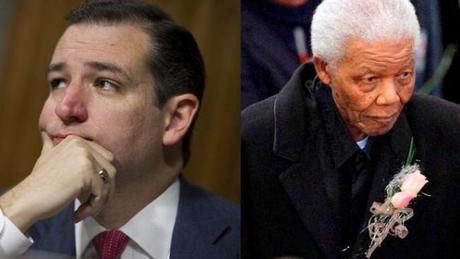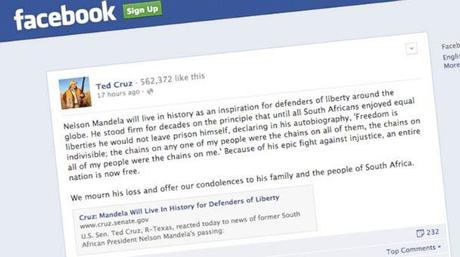By Alan Bean

It has been heartening to read gracious statements from a number of conservative American leaders acknowledging the greatness of Nelson Mandela. Consider these kind words from the Facebook page of Senator Ted Cruz:

Unfortunately, many of the senator’s Facebook buddies were deeply offended by these sentiments. In their eyes, Mandela was a communist agitator who advocated violence and torture.
On the other hand, the post garnered over 5,000 likes, so the reaction from the Cruz constituency was mixed.
When the hateful comments on the Cruz Facebook page were noted by outlets like MSNBC and ABC, the tone of the comments section changed markedly. Go to the comments section now and you will find a raft of liberals hating on the haters.
I wish more of the left-leaning commentators had thanked Senator Cruz for acknowledging Mandela’s contribution to the cause of freedom. Culture warriors rarely know much about the folks they oppose. Most of what passes for common knowledge is culled from “look what the bastards’ are up to now” email subject lines. What emerges is often a crude, unbalanced caricature of what the other side believes and why they believe it.
Liberals visiting the Ted Cruz Facebook page were driven there by news stories about the senator’s hate mail, so that’s what they focused on. Still, when our ideological opposites do the right thing, they deserve our praise. If we criticize the bad stuff, we should be prepared to celebrate the good. And what Cruz said was admirably good.
That said, you can’t really blame the haters or the folks hating on the haters. Both sides have been primed to respond as they do. On the excellent Talk to Action site, Bill Berkowitz reminds us that the conservative movement, in both its political and religious expressions, supported Apartheid and demonized Nelson Mandela for decades. After pointing out that conservatives like Ronald Reagan and Dick Cheney viewed Mandela as a terrorist thug, Berkowitz turns his attention to the Religious Right:
The Religious Right in this country — and the Rev. Jerry Falwell and Pat Robertson in particular — were steadfast in its support of apartheid as well as counter-revolutionary movements in Angola and Mozambique. “The liberal media has for too long suppressed the other side of the story in South Africa,” he said. “It is very important that we stay close enough to South Africa so that it does not fall prey to the clutches of Communism.”
“South Africa is torn by civil unrest, instigated primarily by Communist-sponsored people who are capitalizing on the many legitimate grievances created by apartheid, unemployment and policy confrontations,” Falwell said.
David John Marley noted in Pat Robertson: An American Life that Robertson said the ANC was “led by communists and was hostile to Israel” and “far too radical an element to ever work with,” while “his campaign literature made similar claims for the need to support the white government.”
In an infamous segment on “60 Minutes,” the Institute on Religion and Democracy excoriated the World Council of Churches (WCC) over its support for Mandela. The John Birch Society called Mandela “a communist terrorist thug.”
People who grew up listening to folks like Pat Robertson and Jerry Falwell took their inflammatory rhetoric to heart. They go to the Ted Cruz Facebook page because it reinforces their antipathy for all things liberal–Obamacare in particular–and they aren’t disappointed. But what do they make of the gracious memorial to Nelson Mandela? All they know about the South African leader comes from religious right propagandists. In other words, they are woefully misinformed.
Unfortunately, conservatives aren’t the only people who get most of their information from biased sourced. In essence, the culture war amounts to two well-oiled and highly-financed propaganda machines speaking past each other. Everybody shrieks soundbite mantras. Concepts too complex for a bumper sticker shrivel and die in this world. Messages aren’t intended for mixed company; messages are targeted to the passions (and ignorance) of “the base”. Politicians voice their focus group-tested talking points. Pundits weigh the soundbites in the ideological balance and render a verdict. No wonder our national conversation has become so impoverished.
We need to learn how to speak in mixed company, because we live in an increasingly diverse world. We need a real sharing of ideas grounded in respect for our ideological adversaries and a genuine desire to understand the social and emotional worlds they inhabit. If we must disagree–and at times, we certainly must–let’s know enough about the folks on the other side to engage their actual position.
Next time you see a “look at what the bastards are up to now!” subject line, delete the email. You are being propagandized. Poorly paid interns have been browsing the web looking for ill-considered statements and inflammatory comments from leading figures on the other side that, taken out of context, can be used to fire up the troops on your side of the issue. The intention is not to inform but to manipulate emotion.
I have written a great deal about “messy middle” churches. Messy middle churches are home to folks embracing the full gamut of opinion on every conceivable issue; paleo-conservatives, radical liberals and everybody in between. Pastors of messy middle churches rarely address the Christian gospel to hot-button issues like immigration, social security, the plight of the homeless and the wealth gap because they fear the inevitable disagreements these subjects elicit might prove divisive and unproductive.
If we approach these issues with bumper sticker slogans culled from media culture warriors the result will be divisive and destructive; but that isn’t the way real people of faith talk, especially in the presence of people who are likely to disagree.
Mixed company forces us to choose our words carefully, to think before speaking, to anticipate counter-arguments. In mixed company, we are inclined to put the most gracious spin on our comments because we don’t want to be misunderstood. In other words, mixed company encourages genuine communication.
Ted Cruz honored Nelson Mandela for at least two reasons. First, Cruz sees himself as a freedom fighter and is willing to grant the same status to the great South African. He could have enumerated the points on which he and Mandela disagree, but chose to emphasize commonalities.
Secondly, Cruz is smart enough to know that his Facebook comments would be scrutinized by the media, so he put a gracious spin on the ball. He was speaking in mixed company, and he was smart enough to know it.
